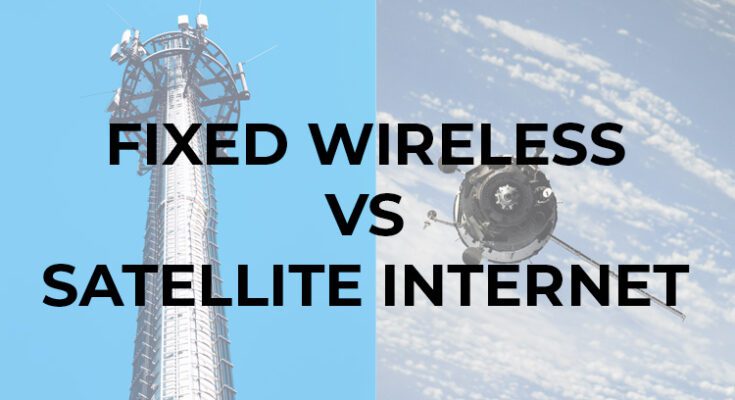In the fast world of the internet, staying connected has become extremely crucial. Are you someone who’s looking for some coherent internet option, especially in rural areas? Two prominent contenders in this broadband era are Wireless Broadband and Satellite Internet. Both technologies bring unique advantages and challenges to the table.
Let us help you make an informed decision about which technology aligns best with your needs. We’ll look at the strengths and limitations of both with some surprising disclosure. Let’s explore together!
Wireless Broadband
Wireless broadband is like the Wi-Fi at your home but on a larger scale. It’s like spreading an internet blanket over a whole area. It’s just like your regular internet but without the annoying cables. 4G wireless broadband internet sets you free from the clutches of wires and cables. No more tripping over cords; it’s a modern-day.
You can get wireless broadband through things like satellite signals and radio waves. This means you can enjoy internet access without being tethered to a desk or struggling with tangled wires.
Whether you’re at home, in a park, or on top of a mountain, wireless broadband is like having your internet genie. It’s the freedom to surf, stream, and scroll without being chained to a wired existence. So, embrace the wireless revolution and have a look at its advantages and disadvantages.
Advantages
- Cost-Effective: It is a reliable internet connection that toon with a good price value. Its cost-effectiveness makes it an attractive choice for budget-conscious users. If you want to have a small tech startup, you should go for this internet option. You get bang for your buck without compromising on speed or reliability.
- Fast and Effective: When it comes to speed, 4G wireless broadband is here to make an impact. You can stream your favorite shows, engage in online gaming, or work remotely with no worries. No more buffering, it’s all about smooth sailing through the digital seas.
- Reliable: Reliability reigns supreme when it comes to connectivity. Wireless broadband offers a powerful internet connection. This robust connection ensures you stay connected when you need it the most. So, next time you have some urgent come up and you’re scared of a weak internet connection, there’s nothing to fret about with wireless broadband.
- Eco-Friendly: It’s essential to consider the ecological impact of our choices as the global is traversing each passing day. Wireless broadband emerges as an environmentally friendly option. It requires fewer physical infrastructures compared to its counterparts. It’s a subtle nod to sustainability while staying connected.
Disadvantages
- Limited Internet Coverage: While wireless broadband boasts many strengths, there’s a challenge lies in its limited coverage. Less developed areas, especially the rural areas might find themselves on the outskirts of this technological excellence. Connectivity becomes a scarce commodity that hinders the flow of data.
That’s it about the pros and cons of wireless broadband. From the above discussion, it’s safe to say that the advantages of wireless broadband surpass its disadvantages. However, it’s still too early to make a final decision. Now, we’ll have an in-depth discussion of the satellite internet!
Satellite Internet
Satellite internet is getting internet from space. It shoots signals from Earth to satellites orbiting high above. These satellites catch the signals and bounce them back down to a dish on your roof. When regular internet waves can’t reach you, satellite internet doesn’t care. It zooms through the sky, dodges clouds and birds, and delivers the best network experience.
Now, don’t expect it to break the speed of light. It’s fast but not “that” fast. But yes, it beats drumming your fingers waiting for a dial-up connection. Satellite internet is your ticket to the online world without concern about your geographic location. So, if you’re tired of being internet-deprived, you should consider satellite internet as your digital lifeline.
Advantages
- Highly Available: Satellite internet can be your superhero of remote locations. Where traditional internet fears to tread, satellites reign without any second thoughts. Whether you’re in a secluded valley or your paternal village with your grandparents, satellite internet extends its digital embrace.
- Less Noise, More Connection: Satellite signals encounter less interference or noise. This results in a clearer and more stable internet connection. Satellite internet offers a visual feast. There is no more squinting through the pixelated screen during virtual meetings. The satellite internet connection is just perfect with it comes to connectivity.
Disadvantages
- Expensive: As we know satellites can traverse the skies. But, as expected the cost of deploying and maintaining them is also astronomical. Satellite internet tends to be more expensive than its terrestrial counterparts. Due to this, it is a less attractive option for those mindful of their budgets. So, if you’re a beginner or have a small team with limited resources, this option will not suit you much.
- Latency: The Uninvited Guest: Satellite internet, despite its reach, struggles with latency. The time it takes for data to travel to and from satellites introduces a delay. Gamers might find themselves amid a digital battlefield, only to be thwarted by the lag monster.
What’s the Ideal Choice?
The decision between 4G wireless broadband and satellite internet hinges on different factors. If you find yourself in the embrace of urban connectivity, 4G wireless broadband emerges as the champion. However, for those dwelling in the far reaches of rural landscapes, where connectivity is a rare gem, satellite internet wins. But wait, here comes the Wavenet Broadband.
Wavenet: Bridging the Connectivity Gap
Now, here’s the game-changer. While wireless broadband might face limitations in coverage, Wavenet is breaking barriers. In a generous move, Wavenet is offering a free trial for the 4G rural internet. This is a great offer for freelancers and digital nomads seeking to untether themselves from urban confines.
This trial comes with a plethora of features, including:
- Unlimited internet
- Speeds up to 100 Mbps
- Freedom to stream, game, and more
- Availability in 50 states
- No contracts
- No credit checks
Wavenet is rewriting the narrative of rural connectivity.
Final Verdict
So, the choice between 4G wireless broadband and satellite internet is not a one-size-fits-all scenario. Each has its merits and demerits, making it difficult for users to navigate. Whether you prioritize speed, reliability, or availability, understanding these technologies will empower you to make a wise decision. As we’ve discussed enough about the digital landscape, get an internet that is swift, reliable, and tailored to your needs.



